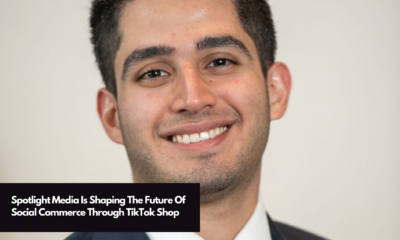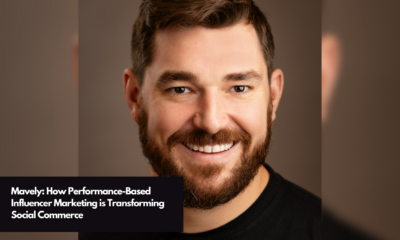Agency
GLOW’s Maggie Walsh Reveals How Fandom Is Reshaping Brand Marketing

Fandom isn’t just for pop stars and sports teams anymore. It’s gaining traction in the creator economy as well.
GLOW, an independent creative agency born in New York City, has gone from its entertainment and social media roots to implementing fandom-driven strategies across industries worldwide.
The agency serves a mix of entertainment and consumer brands, including the NBA, Paramount+, Peacock, Jägermeister, and Hyatt. Its services span social media strategy, content development, digital out-of-home advertising, brand platform creation, and paid media strategy.
At the center of this expansion is Maggie Walsh, GLOW’s Head of Strategy. She brings a diverse background to her role, having worked across the music, television, and agency worlds.
Maggie has witnessed firsthand the shift from traditional marketing to the creator economy. Now, she is applying the power of passionate fan communities to elevate brand marketing in unexpected ways.
Under her guidance, the agency aims to turn casual buyers into devoted fans by helping brands maximize their marketing spend in an era of tightening budgets.
“Brands are looking to build long-term value and customer loyalty,” Maggie says. “If we can take what we know about fandom and apply that to brands, we can help them impact their bottom line, grow, and have lasting influence.”
Maggie reveals GLOW’s approach to brand strategy, discusses the rise of “fangirl culture,” and makes a compelling case for long-term brand building in an era of short-term thinking.
Beyond One-Offs
Maggie points out that brands are fascinated by the creator economy: “We know that there’s attention, we know that there’s money, and there’s things that you can create and build from that, and that’s exciting for brands.”
However, she cautions against treating creator partnerships like simple media buys. “The pitfall I see is that you start to lose your brand story,” Maggie explains.
GLOW advocates a two-pronged approach to address this challenge. First, brands should adopt an “experimental mindset,” making small bets with creators to learn about their audiences. Second, they should integrate these learnings into long-term, consistent strategies.
Maggie cites GLOW’s work with Jägermeister as an example: “We do monthly content collaborations with different creators to get a sense and experiment. And then the ones that we like and work, those are getting built into bigger campaigns so that we can continue to build consistency and those long-term relationships.”
Harnessing Fan Culture
GLOW’s approach to developing campaign strategies that leverage social fandom revolves around two key concepts: “fan-worthy” and “fan-fueling” elements.
“Category one: What is fan-worthy about your brand? You don’t want to lose the essence of what your brand stands for,” Maggie explains.
The second aspect, she notes, is “What is fan-fueling? Those things are part of a culture that changes pretty frequently.”
Maggie illustrates this approach with GLOW’s work on Peacock’s Olympics coverage.
“They came to us with this challenge of, ‘We want Peacock to have a distinct and ownable voice within the games,’” she says. The team focused on making the Olympics relevant to younger generations by treating content “as if we were fans.”
This strategy led to a shift in focus. “It’s not about the medal counts,” Maggie explains. “It’s about the thirst traps, the rizz of all these different athletes, and the weird jokes they’re making within the Olympic Village.”
GLOW’s approach also relied on real-time adaptation. “We had a 15+ person war room every day,” analyzing what people talked about and how fans would act, Maggie shares.
The results were significant. “It was honestly the most streamed Olympics of all time,” Maggie reports. “Impressive numbers on their social channels that not only were excited about the Olympics but are now sticking around for Peacock’s future programming.”
Tailoring Brand Strategy to Emotional Connections
GLOW’s take on brand strategy across different industries hinges on understanding consumers’ unique emotional relationships with products in each sector.
“Consumers’ emotional relationship to different sectors and industries is very different,” Maggie notes. She illustrates this point by contrasting the emotional investment in choosing alcoholic beverages versus everyday items like toilet paper.
This understanding forms the foundation of GLOW’s strategy across sectors. “That’s usually the place that we start: ‘What is the consumer or eventually that fan relationship to this sector, this industry, this product?’” Maggie explains.
This allows GLOW to identify opportunities for brands to stand out within their categories. Maggie cites Liquid Death as an example, noting how the brand applied the emotional engagement typically associated with beer to the water category.
Moreover, GLOW leverages its experience across industries to cross-pollinate strategies. Maggie says that the concept of fandom, deeply ingrained in the entertainment industry, is now sought after by brands across all sectors.
She argues that fostering fandom can lead to stronger customer loyalty and greater long-term value. “There’s a much greater return on a fan than a customer just in terms of money and value over time,” she says.
The Rise of Fangirl Culture
Maggie identifies a major shift in consumer behavior that she calls “the rise of the fangirl.” This trend represents a change in how traditionally female-centric interests are perceived and valued culturally.
“There has been this massive shift where young girls’ interests – which have always been deemed frivolous, unimportant, and unserious – have become key in supporting and celebrating the interest of women and girls,” Maggie observes.
She points to several examples of this trend, including Taylor Swift’s cultural impact and the emergence of phenomena like “brat girl summer.” She notes, “Even the term ‘brat’ used to be negative… That got reclaimed.”
This shift is also evident in the reclamation of terms like “yap,” traditionally used to dismiss women’s conversations.
“The gossip and conversations of women have always been deemed a little bit less serious, a little bit more frivolous, and instead, it’s all channeling into this growing movement towards the fangirl and girlhood,” Maggie notes.
She believes that the implications for brands and the creator economy are significant. This trend suggests a growing market power and cultural influence wielded by young women and their interests.
Maggie sees this as a positive development: “It doesn’t look like what people said it would look like if more women and girls got power. It’s our own thing. And I think that’s awesome.”
Advocating for Long-Term Brand Building in a Short-Term World
Maggie touches on a critical challenge in the marketing industry: the prevalence of short-term thinking.
“If I have one big frustration, it’s the short-term thinking,” she states, pointing to the pressure on CMOs and brand marketers to deliver quick results.
The exec argues that the abundance of real-time performance data has inadvertently fostered a myopic approach to brand value.
Drawing from research on brand performance during economic downturns, Maggie highlights a counterintuitive truth: “The brands that cut spending and stopped spending during that time lost value and had a harder time bouncing back than the ones that increased their spending.”
Despite evidence supporting long-term brand building, Maggie observes that many decision-makers struggle to prioritize it due to pressure for immediate results.
“If I could wave a magic wand, I’d want to convince the people empowered to build and invest in long-term brand building,” she says.
Maggie advocates for a shift towards sustained brand investment, mainly through cultivating fandom.
“If you’re a CMO and trying to figure out how to get more value out of it, I will always say invest in fandom because it will impact your bottom line,” she concludes.













